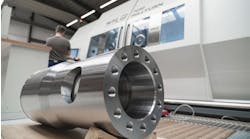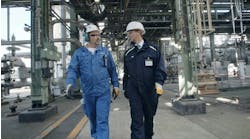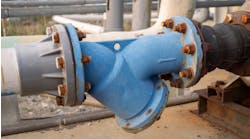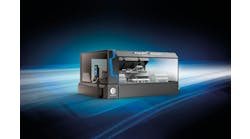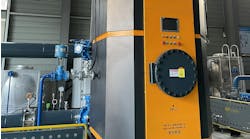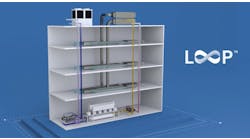Trenton Forging is expanding its complement of in-house machine tools to support its “First to Market” concept of producing production tooling in as little as one day to meet customer demands. The Trenton, MI, company produces multiple-cavity die forgings for a wide variety of customers.
In a recent example of First to Market, Trenton produced an ATV ball joint housing with lead-time measured in hours rather than days. A 3-D model for the part was received from the customer. Using the model, Trenton engineers developed a forging drawing for inspection purposes and for in-plant reference.
Then, using the model, Trenton engineers developed the machine tool path for manufacturing the die. Trenton’s 18,000-rpm CNC milling machine tools were programmed, and in less than 10 hours the forging tooling was complete. Trim and coin tooling was completed on complementary CNC equipment, and the next day sample forgings were produced.
“More and more we are also taking customer designs and concepts and cutting plastic models for evaluation,” the company elaborates at its website. “This is an important tool for quickly evaluating new ideas and potential cost-savings, allowing customers to quickly evaluate how these designs will affect their internal operations. “
In-house die machining
The move to in-house die machining began in October 2000 with the installation of two new 18,000-rpm machining centers for die milling, in a new building dedicated to that capability. These systems are Deckel Maho Gildemeister (DMG) DMC100V 18,000-rpm high-speed machining centers, and each is capable of producing a new die half in 8-10 hours.
Last year, Trenton installed several more pieces of new equipment in support of its First to Market concept. Each item has engineering and design features that benefit the forging operation by providing the latest in programmable and tolerance controls. That new equipment includes:
Three new Standard Industrial Corp. 1,000-ton hydraulic coining presses. These are said to give Trenton Forging more productivity, while providing superior shape and flatness, closer tolerances, and improved surface finishes. They offer laser speed measuring, automatic gauge controls based on mass-flow principle, and shape measurement with automatic feedback control. These three units replace ten 150- to 1,000-ton mechanical presses.
A Deca Coil high-production magnetic-particle inspection system. Highly automated, its speed of inspection is set by the size of the part and the belt speed. It inspects for potential cracks, forging laps, and any discontinuity in the forged material, and it is useful for verifying high-volume automotive applications, such as steering and suspension components.
Additional CNC die-room equipment. This includes a 13,000-rpm machining center, a 10,000-rpm machining center, and wire EDM equipment.
In support of in-house die-machining, Trenton Forging has four engineers working daily with Pro/ENGINEER version 2001, AutoCAD 2000, PowerMill version 3.1, and MasterCam version 9.1
Focus on custom forgings
Trenton Forging’s focus is on custom forgings, not commodity items. It can produce parts in quantities from short runs of 1,000 pieces up to, and including, parts running 1 million pieces per year. However, annual production volumes average 60,000 to 80,000 pieces per year. This approach allows Trenton to serve all its customers, and does not tie up production schedules by running only high volume work.
With its high-speed CNC machining centers, dies and samples can be made in two to three days, if required. “Our competitors require development lead times ranging from eight to sixteen weeks,” the company explains.
Trenton Forging’s pursuit of QS9000 certification and its commitment to continuous improvement has resulted in numerous performance efficiencies. For example, it averages 35 inventory turns per year, compared to the industry median of just 6.5 turns (the latter figure is based on data compiled by the Forging Industry Assn.) This is an indicator of Trenton’s ability to execute “rush” orders on a regular basis.
Trenton Forging serves a broad range of customers, from Fortune 500 OEMs to smaller component supplier companies. It sells products to Tier 1 and Tier 2 suppliers in both the automotive and truck markets.
In addition, Trenton Forging now serves customers with railroad components, recreational vehicle parts, other transportation products, hand tools, building construction parts, machine tool components, performance racing components, among others.
While most of Trenton Forging’s customers are located in the Midwest, it has buyers across the U.S., Mexico, and Canada.
Trenton Forging Completes Re-certification to ISO/TS 16949:2002
As a Tier Two supplier to the automotive industry and a producer of forgings for truck manufacturers, agriculture equipment makers, and railcar producers, Trenton Forging didn’t wait for customers to insist on QS 9000 certification. In his search for continuous improvement, Trenton president David Moxlow simply decided QS9000 certification fit the company’s mind-set of “quality first.”
Trenton Forging Co. achieved QS9000 in early 1996, and recently it finalized re-certification to the new industry standard ISO/TS 16949:2002.
ISO/TS 16949, published in March 2002 by the International Automotive Task Force, focuses on continuous improvement to reduce costs in automotive manufacturing. The standard specifies quality system requirements for the design and development, product installation and servicing of automotive-related products. The certification process emphasizes defect prevention and reduction of variation and waste in the supply chain.
ISO/TS 16949 has become the standard required by the Big Three automakers, which now are awarding new contracts only to suppliers that have achieved this certification.
“We view change as Trenton Forging’s primary competitive edge,” says Moxlow. The approach works for the company, which has doubled its sales over the past five years.
Founded in 1967, by George S. Moxlow, Trenton Forging has a history of maintaining long-standing customer relationships built on superior quality and performance.
The company’s website states: “We enjoy a diverse customer base ranging from Fortune 500 OEMs to smaller component supplier companies. We supply transportation products, railroad components, recreational vehicle parts, hand tools, building construction parts, machine tool components, and much more.
“While our customers are located primarily in the Midwest, we service customers throughout the US, Mexico and Canada. Geography is not a barrier. We encourage inquiries from potential customers located from coast to coast.”

